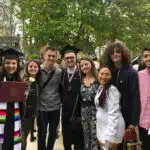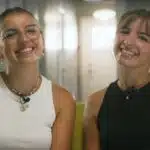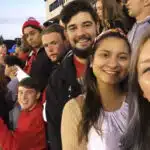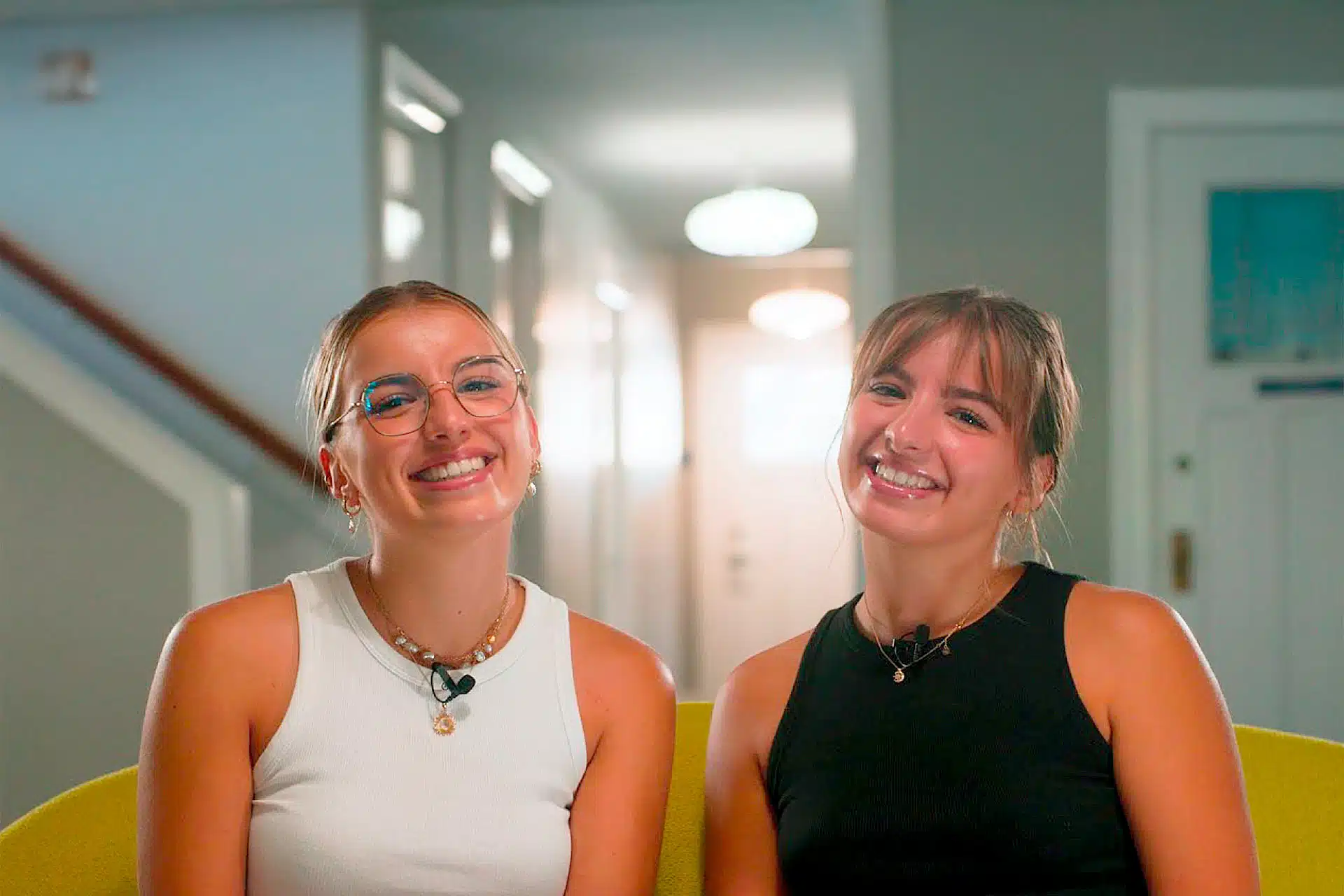
Barely even 20 years old… soon to graduate from an American university and already the founders of their own business! Fiona and Anaïs have already participated in 8 programmes with PIE between them (with the help of their parents) and are pursuing similar paths, in ‘true, identical’ twin style, that are both unique and ambitious.
In their interview with us, they each discuss their motivations and hopes. Their voices blend together (to the point that it’s sometimes hard to tell which one is speaking), but it’s neither messy nor confusing – it sounds more like a harmony…something that’s almost impossible to describe since it’s more like music than actual words.
Talking about Anaïs and Fiona’s adventures also means reflecting with them about what it means to be twins, that special bond between them that makes them successful young women, both searching – and probably always will be – for balance between this togetherness and their own individuality.
Given the number of PIE programmes you have participated in, you and your parents are considered a part of the wider ‘PIE FAMILY’. Can you tell us a bit about your journey with our organisation?
Fiona – We discovered PIE in 2017, and we did two ‘trimester exchange’ programmes, so two departures – I went to Australia and Anaïs went to Canada. Then we hosted two exchange students from the same programme in both 2019 and 2020, followed by hosting a Canadian student for a year in 2021, and now we’re set to host a German student for the 2022-2023 year.
Anais – Without forgetting both of our trips with PIE/ Go Campus in 2019! In total, our family has already done 8 exchanges in 5 years!
Fiona – And our younger sister also wants to do one. So it’s soon going to be 9 trips in total.
How have you built such a strong relationship with PIE? How did it start?
Anais – I was in 10th grade. At the start of the school year, a girl in my class wasn’t there for the register. They told us that she had gone to Canada, and that she was going to return after Toussaint (roughly around Thanksgiving) and that a Canadian student would be joining our class. It really interested me, because I had always dreamed of going abroad, I had even spoken to my parents about it. They weren’t against the idea and told me to find out more about it. Since this student had gone through PIE, I looked into the organisation and started the process.
Yet, it was you Anaïs who did all the research and Fiona who ended up going?
Fiona – Yes, so I really wanted to go as well. So, we decided as a family that I would get to go first since Anaïs was a bit more settled in her classes: it was better for me to miss the first two months of 11th grade and Anaïs – who would have a much easier time catching up while away to prepare for her exams – would miss the beginning of her senior year.
What do you think is the biggest lesson you took away from your exchange trimesters abroad?
Fiona – The 3 months in Australia completely changed me. Whilst I was there, I really started to appreciate nature (believe me I was spoiled with it), and adventure as well. Adventure in every sense of the word. Not only discovering a new language (which I really didn’t know well at all). I loved it. There was also the internal adventure as well, the complete transformation of your mindset. When I came back, I was a completely different person.
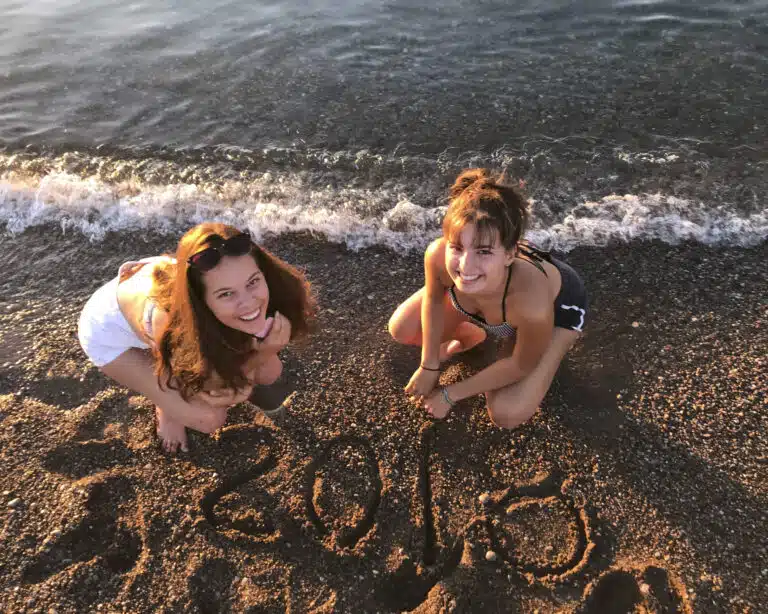
Did your family recognise you?
Fiona – Laughs
Anaïs – Seriously…she really did change. For me, who hadn’t gone yet, I saw a real change. I remember a small detail, something simple, but it really stood out to me – something to do with her fashion sense. She had completely changed her style, and at the same time she told me, “That stuff doesn’t really bother me that much”. She was so different from the French mindset that we all more or less have during our time in high school.
Fiona – It was actually the first time that we’d been apart, so of course it felt like there was this huge distance, almost like a whole world between us.
Anaïs – Yeah, she’s right, she had definitely gone down a different path. I didn’t really see the difference at the time, I only really understood it later.
Was there a bit of jealousy on your part?
Anaïs – Yeah of course. A little bit of admiration as well. It’s almost as if Fiona had moved on and matured, and I was still a child. And of course, it made me even more excited for my chance to go away. But I also wanted to do it in my own way, so I decided to choose a different country. That’s the reason I went to Canada.
Was your experience similar?
Anaïs – No, not really. Most of my discovery was to do with family and school life… cultural things as well. What stands out most from my exchange are all the people I met: the classes, the teachers and how different their approach was.
Tell me about reuniting after spending two years on opposite sides of the world?
Fiona – mind you, before our time away we didn’t get along!
Anais – Oh definitely not!
Fiona – In middle school, no one would say we were friends. But when we came back, we definitely grew closer. We became best friends.
But you told me you were always together?
Anais – Yeah, we were together a lot, I guess more out of necessity or habit, but we didn’t really get each other. Since we’ve become more independent, we are definitely closer.
Really that much?
Anaïs and Fiona (like an echo) – Oh yeah definitely!
Fiona – We’re a team now.
Anaïs – A duo. The fact that we both lived the same experiences so far away from each other, has meant that we have been able to reconnect over our similar experiences. Suddenly we are on the same wavelength.
It’s like you suddenly had something in common beyond just being twin sisters, and we’ll speak about that more later. But before that, let’s talk about your experience hosting students.
Fiona – We loved showing our exchange students around, we tried to do everything possible to make them feel at home, like it was their own place. It’s such a great feeling when you manage to do that. Rachel’s stay, since she was here for longer, went really well in that sense.
Anaïs – And that made us think about the whole twin thing. Before these exchanges, we kind of just stuck together, like a little closed of duo. But the risk of doing that is that we would rely on each other too much. And we gradually realised through our experiences that we needed to include and socialise with other people, including our exchange students.
Fiona – It really is thanks to all our exchanges (Hosting and going away) that we became more open minded in the way that we do things.
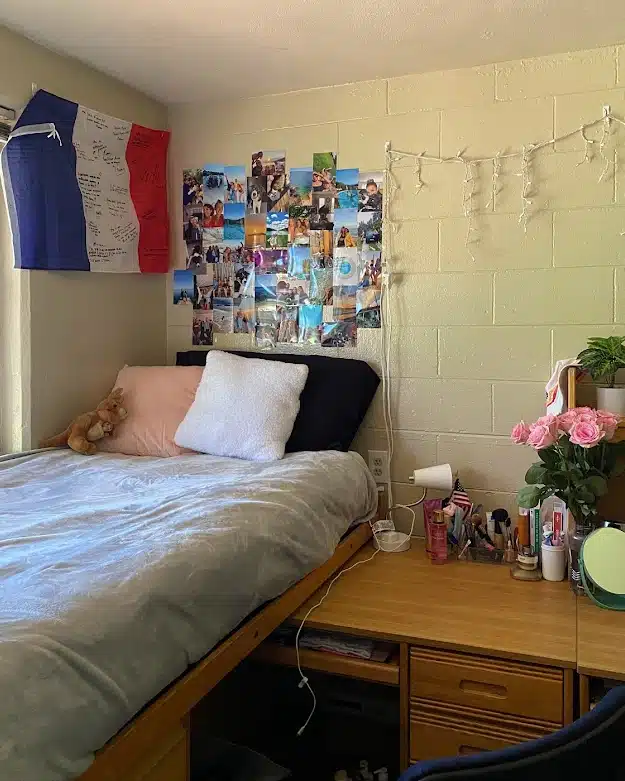
When did you decide to go abroad again and study in the US?
Fiona – Final year exams were approaching, and it was time to decide our next steps. I didn’t see myself continuing my studies in France, it didn’t interest me whatsoever… and Anaïs felt the same. PIE had just launched its American university program (with Go Campus) and so our parents encouraged us to look into it. We thought a lot about it, did tons of research (we went to your meetings…even read everything). There were quite a few hurdles, especially in terms of financing it, but once we realised it could be possible, we went all in (application, TOEFL, etc.), we were both super motivated!
Another joint project, were you were both just as excited?
Anaïs – At first, we were totally set on going our own ways… there was no way we would ever go to the same campus.
Fiona – And then as soon as we got to choosing our university, we realised that we both had the same preferences.
well well well!
Anaïs – Yeah, both for the location, lessons, cost etc. it was out of our control: we had exactly the same preferences and so Menlo ended up being the one we both loved.
Fiona – We thought that the campus was big enough and so we didn’t have to be together all the time. We would just figure it out and each do our own thing.
And in the end?
Fiona – well… I think that we became even more inseparable.
Anais – Laughs
And you both decided to do a whole degree while in the USA?
Anaïs – Yes, a bit different to a lot of students, right from the outset we chose to study for 4 years and graduate there.
Fiona – We’re actually going to be able to graduate in three and half years by filling up our schedules and finishing our classes more quickly. We’ll be done in December!
In which area of study? What major did you both choose?
Anaïs and Fiona (at the same time) – International management.
Anaïs – We took different classes so that we wouldn’t end up in the same ones. When I was taking English, Fiona would take maths and vice versa. But in the end for the last few classes of the curriculum, we often ended up together in certain subjects.
Fiona – But it’s no problem though.
Compared to your school experiences, what stands out from your experience at university?
Anais – It’s really different. At university, you are thrown in at the deep end without a family to support you. It really gives you independence on pretty much every level. At university you learn to be independent.
Fiona – With that being said, you live on campus, in such a tight-knit community, that your friends become your family, and the campus feels like a home. The surroundings are really comforting, and you quickly feel like you’re in your own little bubble.
Anaïs – The bond between international students is particularly strong. We are all in the same boat (literally in the same house) and therefore have become more like brothers and sisters.
What’s the main difference, in terms of overall approach, between American and French education systems?
Fiona – The way of thinking. In that respect, we are complete opposites. In France, it’s all about fitting into boxes. The system is so rigid with a clear path that’s already been mapped out for you. You can’t escape it. Here in the USA, you are pushed to figure out who you are, what you want to do and what your passions are. You are pushed to take risks, and they want you to be entrepreneurial.
They don’t teach you things, but they push you in that direction. Getting involved in projects is just part of the American mindset.
Anaïs – They also really emphasize the importance of ‘networking’ (as they call it); all the connections that the university helps you build during your studies, which boost your journey – first personally, then professionally. Opposed to French professors, American professors mostly come from a more professional background. Thanks to this, they all have a ton of knowledge and connections. That’s the reason why on campus, and through studying and general university life, you already meet such a remarkable number of people. It’s really rewarding in that respect.
Fiona – We study in California, right in the heart of Silicon Valley. We come across some really incredible people here. Real gems…and because of that, it really expands our network.
Anaïs – I’ll add another important point: the fun side they add to studying. You’re always surprised. It’s more about the practical aspect than the theoretical one.
What problems have you found in this way of teaching?
Fiona – The lack of discipline, without a doubt. It’s easy to get distracted. The approach is less strict.
Anais – Basically, there are fewer scheduled classes, more free time and more opportunities to do things alongside your studies, which is great but it can also lead to you getting distracted.
Any examples?
Anaïs and Fiona – At the start of term (so next week) we are going to take a painting class. We are going to just see what it’s like.
Anaïs – I did a semester of Chinese. However, starting as a beginner with zero knowledge as well as having English teachers meant that learning Chinese was not easy.
Fiona – I joined the athletics team (track and field). I loved it but it was really intense to the point where I got injured. And the competitions weren’t really my thing. I stressed myself out too much. But that’s just my experience.
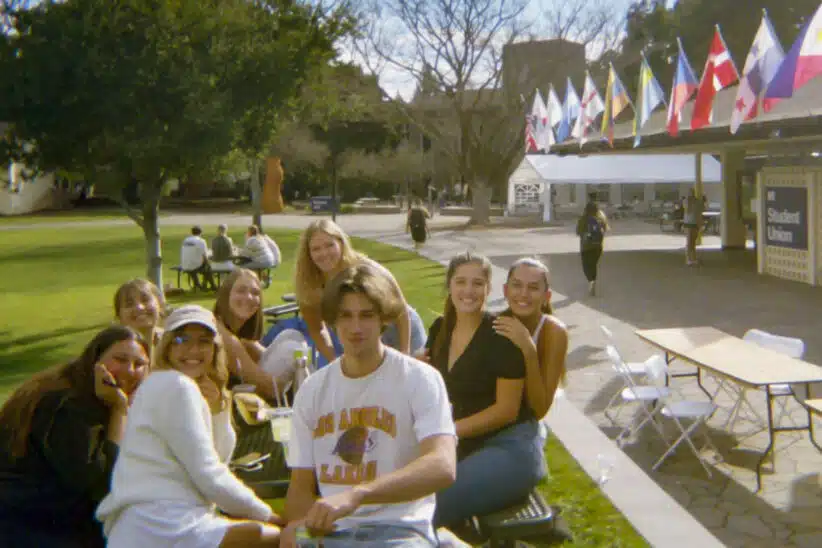
Talk to us about this organisation that you’ve set up?
Anaïs – We’ve always planned to start our own business, but we thought we’d really do it after finishing our studies (one day…when we have more time). But with Covid we had to come back to France for a while, and as we had to do all our classes online (and mostly in the evenings), we had more free time. So, we just went for it.
Fiona – Yeah, the opportunity came up, but I do think that without the American mindset – which had already heavily influenced us – we wouldn’t have even dared. Our French friends are almost shocked: “But you’re crazy to do that. You are too young”.
Anaïs – The reactions from adults are by far worse! But we stuck with it, we didn’t give up.
What’s the business about?
Anaïs – We created our clothing brand all focused on handmade items. We design, cut and sew. Then we manage our marketing on social media. We just created our website. We do absolutely everything from A to Z, from the design to production. We base lots of our products around the idea of eco-responsibility.
Fiona – Yeah, the way we operate goes against fast fashion and over consumption
Are you happy with the outcome?
Fiona – In France, it worked pretty well from the start, but when we switched to the USA we had to rebuild everything (we didn’t even have a sewing machine). But we are starting to really make it work here now.
Anaïs – In the US, the market is different. We had to adapt to be more affordable in terms of pricing (because our main target market is students), all while staying true to hand made products and a collection and vibe that truly reflect us. We began with just a clothing line for girls but now we’ve extended our range to also have a unisex collection.
What is your brand name?
Fiona – “French twins”.
Anaïs – It’s our nickname on campus, and since it stuck so well and really made its mark (pun intended), we decided to go with it.
What is the link between the overall vibe of your brand and your travels?
Anaïs – People’s fashion sense is a cultural phenomenon in itself. And we are so fascinated by this aspect and approach to culture.
Fiona – In Australia, I discovered another side to clothing: one that is much less chic, more practical, and above all else, comfortable. In the US, it’s not too dissimilar from that (you can wear sweatpants and a big blanket!). Our approach – whatever side of the Atlantic you are on – is a bit quirky, it lets us adapt and create a new identity that brings together different, yet complementary viewpoints.
Do you think that you’ll continue your studies to get your Master’s Degree?
Fiona – No. I would like to get a bit more professional experience.
Anaïs – There is also the question of money!
Fiona – Once you’ve got your degree, the campus programme lets you, through the Optional Practical Training framework (or optional trainee), to stay in the US for another year if you find a company that is willing to take you on as a paid intern (it’s almost a salary). We are going to try and do that. Our second aim is to take “frenchtwins” up a level… especially by finding investors. We are considering, in the foreseeable future, to expand it outside of America.
Anaïs – We’re thinking about Australia, especially because over there, it’s all about handmade stuff
Fiona – To be honest, we don’t really want to know what’s going to happen in the not-so-distant future, what we’re going to be doing, because we really want to make the most of the opportunities that are coming our way.
Anais – And the people we’ll meet.
What do you think your next steps will be?
Anaïs – We don’t really know. At the beginning we said that we would stick together, but right now I’m thinking about going solo to a new country where I don’t know anyone or anything, just to push myself out of my comfort zone. We’ve said to each other that we need to still be able to follow our own separate paths.
Fiona – We would still keep “FrenchTwins” as our shared thing.
Anaïs – Yeah exactly. That’s just something that we’ll never get rid of.
Fiona, what is Anaïs’ best quality?
Fiona (without hesitation) – Creativity. She thinks a lot, has lots of imagination. She’s the one who designs, sews and creates everything, from start to finish…but I take care of the other stuff: marketing, communication, and getting things ready.
And Anaïs, what is Fiona’s best quality?
Anaïs – She is always looking ahead, she takes the initiative, she is entrepreneurial. In our partnership, I’d say I’m the brain and she’s the legs. Fiona’s the one who gets things going.
If you both go your own ways, how will you manage without the other’s heads or legs?
Fiona (smiles) – I will maybe have to slow myself down a bit, give myself time to think and reflect.
Anaïs – I will have to challenge myself. I’m going to have to be brave and take some action.
What would you have done if you hadn’t come across PIE.
Anais – PIE was the starting point of all our travels, so…
Fiona – Without PIE, I personally think that I would be a girl… how do I put it? More boring, just following the typical business school path. I’m not sure I’d actually be happy.
Anaïs – We often ask ourselves the question of what we would have been like, because when we come back to France, we are surprised by the difference that we feel between us and our friends, with the environment and how mapped out their lives are. We feel like things are just stuck in the same way as they were before.
Fiona – And I also feel like the two of us wouldn’t really get along. These trips have made us figure out who we really are.
How could PIE improve?
Anaïs – Your wider visibility/reputation. You should be spoken about everywhere, in high schools, middle schools etc.
Fiona – The support side of things could be improved. Before leaving, you are super present and attentive, but once we’re there, we don’t hear much from you. But at the same time, this is certainly part of the campus experience.
